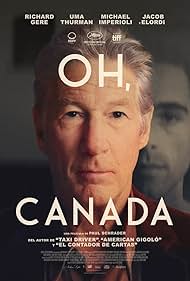Leonard Fife, one of the sixty thousand draft dodgers and draft dodgers who fled to Canada to avoid serving in Vietnam, shares all his secrets to demystify his mythologized life. Based on the novel “Foregone” by Russell Banks. This is the second time Paul Schrader has directed one of Banks’ novels for film, following his adaptation of Aflicción (1997). Featured in the podcast Film Junk: Episode 961: In a Violent Nature + TIFF 2024 (2024). Richard Gere is a respected filmmaker of hard-hitting, smear-inducing documentaries. He works with his wife and producer, Uma Thurman. Many years ago, he fled the United States to protest the Vietnam War. It’s 2023, he’s dying, and several of his students are making a documentary, interviewing him during the protests and under the watchful eye of his producer and wife, Uma Thurman. Schrader is a meticulous screenwriter, and there are many ways to interpret this film. Some critics have called it “autobiographical” because they’re so intellectually lazy that they don’t bother to think about more than one thing before giving up. There may be autobiographical aspects to this film. It certainly reflects Schrader’s views, rather than those of, say, a panda, or a chunk of rock scraped off the Laurentian Shield in the terminal moraine of Long Island. That, I don’t think, makes it autobiographical, any more than the fact that the guy is a filmmaker. There are filmmakers and filmmakers. Even though Gere and the people who make the movie within the movie want to make a sensational movie at any cost, Miss Thurman’s only wish is to protect her husband, even though she already knows the worst. I wondered if this movie was a meditation on filmmaking itself. There are certainly aspects of that. A filmmaker shoots many more feet of film than he ultimately needs, and edits it into a final form that may or may not have anything to do with reality or the filmmaker’s original intentions. As Gere dies on camera and throughout the film, the events of his life that he wants to tell get mixed up and confused with each other. To make sense of it all, to make a movie out of it – because the guys who are in the movie already have a contract to sell the movie – you’re going to need an editor. That’s the real job of any storyteller: to organize the events and the characters of a story in such a way that it makes sense to the audience. But to understand this film, you have to understand that, like other Schraeder films, it is primarily concerned with outrage. In some ways, his work resembles that of Ingmar Bergman: raised religiously, he questioned human fallibility in a world without God to provide an objective framework of good and evil: bewilderment and disappointment, leaving the audience to wonder how to construct a moral system. Schraeder, on the other hand, seems outraged, filled with despair, and leaves it to the unfortunate survivors to clean up the mess. Gere leaves it to the filmmakers to make sense of his interview, and to Miss Thurman to clean up the mess and lies he has made of his life. It is not Gere’s problem: he is dead. And it is not Schraeder. Anyway, these are two of the ways of looking at the film that I have imagined. If you see the movie, even though there are no explosions or good jokes, tell me if they make sense to you. And if you have different interpretations too.




 39/19
39/19